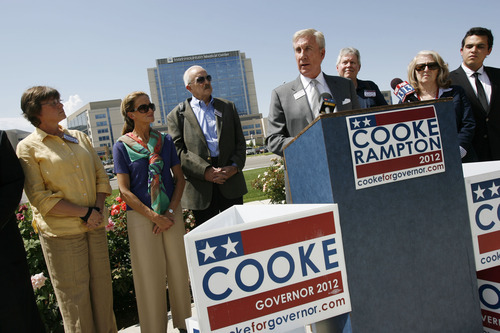This is an archived article that was published on sltrib.com in 2012, and information in the article may be outdated. It is provided only for personal research purposes and may not be reprinted.
Protecting Hill Air Force Base from closure requires more than a governor who believes an efficient base is a safe base, Democratic challenger Peter Cooke charged Tuesday.
The Cooke campaign invited a county commissioner from Oklahoma to detail how that community transformed a defunct General Motors plant into part of Tinker Air Force Base, presumably providing some protection in a possible 2015 round of base realignments and closures.
Voters in Oklahoma County approved a slight property tax hike that raised $45 million and the state kicked in $10 million to buy the GM plant, which the base now pays $10 a year to lease.
"They took a risk and moved forward," said Cooke, a retired two-star general in the Army Reserves. "What I'm tired of in this state is no plan."
The Air Force this year made Tinker its lead Sustainment Center, elevating it over the downgraded Ogden Air Logistics Center and two others. The Ogden center lost 159 jobs, including a number of headquarters staffers who transferred to Oklahoma.
Marty Carpenter, Herbert's campaign spokesman, said the governor considers it a top priority to protect HAFB, and works with the Utah delegation in Congress to ensure the base's strategic importance is known and valued.
"A lot of what you do to protect the interests of HAFB is … behind the scenes, the working relationships with federal delegation that make the difference," Carpenter said.
Cooke did not specifically detail what he sees as failures on Herbert's part, nor what he would do differently. He also didn't directly blame the governor for the Air Force decision to downgrade Ogden's center. But, he said, "The dots need to be connected."
Cooke also appeared unfamiliar with the Utah Defense Alliance. Instead of answering questions about his view that the alliance — like the governor — is doing little, Cooke repeatedly asked reporters to show evidence of the alliance's effectiveness.
That non-profit coalition of business and government leaders in northern Utah began in the 1990s during a Base Realignment and Closure Commission (BRAC) process, and has been active in making the case for HAFB each time a new BRAC process is underway.
Vickie McCall, the founder of the alliance said, "It would be a huge misstatement to suggest we're not working on BRAC." She was the chairwoman of the alliance during the 1995 and 2001 BRAC processes and remains on the executive committee.
Two former base commanders are active in the alliance, and there is frequent communication with base leaders, the Congressional delegation and sources at the Pentagon, she said. The work is done quietly because it's strategic, she said. When Air Force Secretary Michael Donley made a visit to the base this summer, alliance leaders were among those who met with him.
"We have a budget to travel and we do," she said. "We are absolutely all over this issue."
The Legislature approved and the governor signed legislation last session giving the alliance $500,000 toward its lobbying efforts in the next round of BRAC.
In Oklahoma, the massive former GM plant doesn't house the newly configured Air Force Sustainment Center that drew jobs from Utah, said Oklahoma County Commissioner Raymond L. Vaughn Jr.
But it allowed the base to modernize and move other functions, and opened up another 1 million square feet of factory space for future missions or business leases.
"The message we learned in Oklahoma is you've got to be proactive," Vaughn said. "That's what really impresses folks in the Pentagon."
HAFB, along with the University of Utah, is one of Utah's largest employers with roughly 24,000 military and civilian workers on base.
Cooke pointed to his role in bringing two commands to Fort Douglas — the 807th Medical Deployment Support Command and the U.S. Army Reserve Joint and Special Troops Support Command. That happened as the 96th Regional Readiness Command, which Cooke commanded, was deactivated and he retired in 2009.
Neither new command has many employees in Utah, but his success in persuading the Pentagon, he said, is what's important.
"I have a track record of bringing two installations to this state," Cooke said. "If elected, as governor, one of my first trips will be back to the Pentagon to find out what the process is [for BRAC]."



